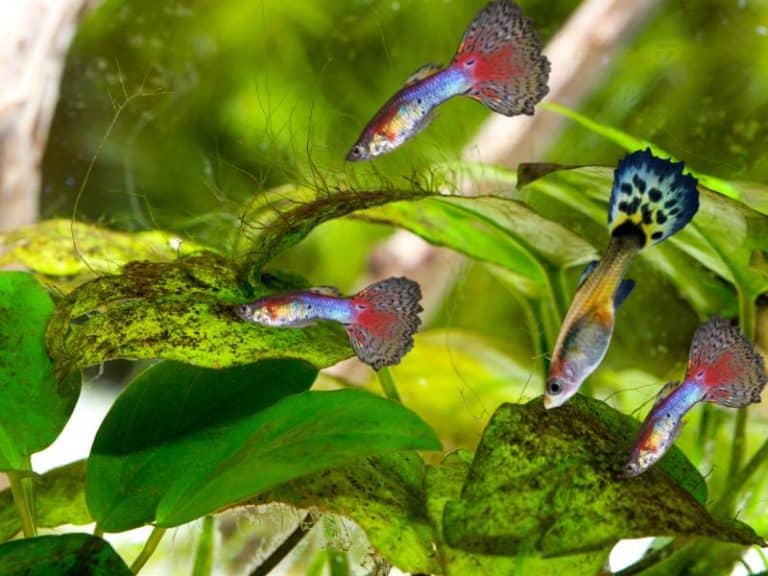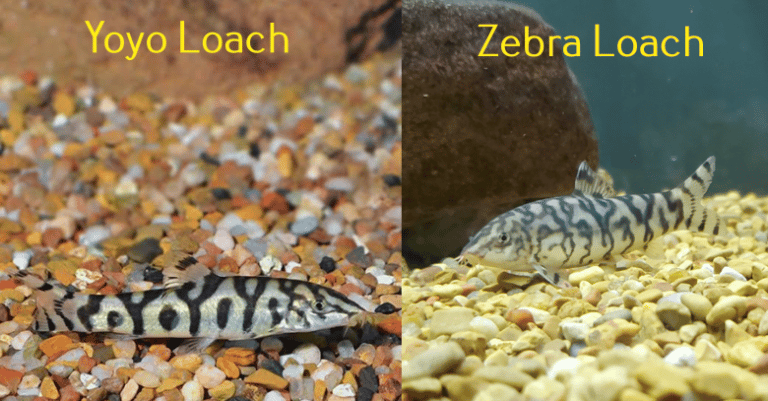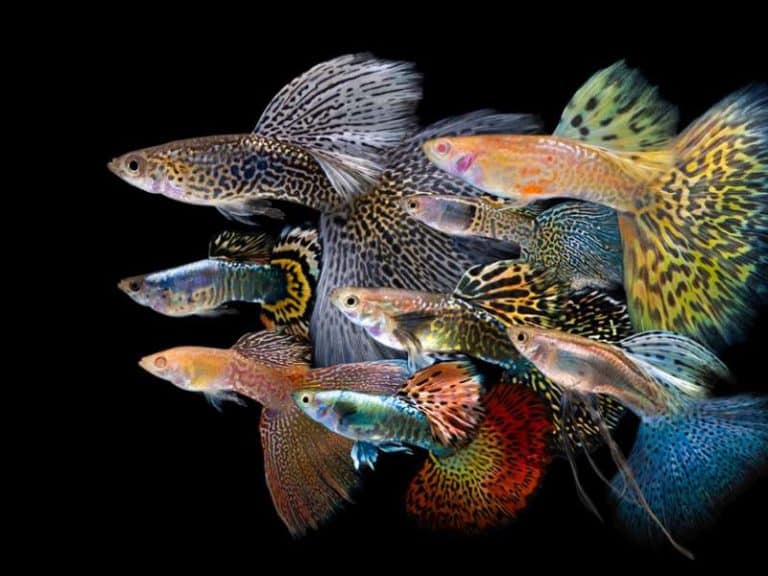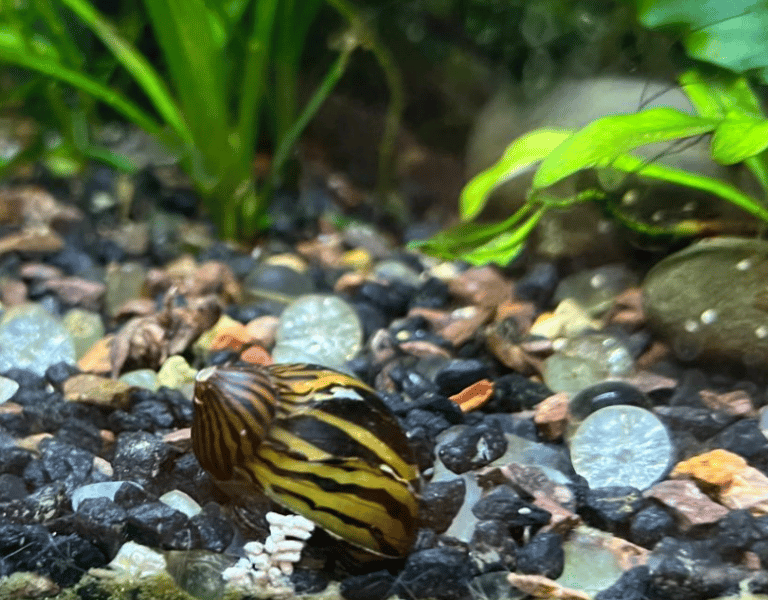Pregnant guppies are prone to stress that can kill them. Poor water quality, new tank syndrome, and poor nutrition can also kill them during pregnancy or while giving birth.
One way to tell if a guppy is pregnant is that they tend to hide from the rest. Thats the only way females can ensure the peace and security of their young ones because they become slow and can be easily attacked in their natural habitat.
What kills a pregnant guppy?
While pregnant, guppies experience reduced activity and poor eating habits, making them weaker. If they do not eat as required, their immune system is weakened, leaving them vulnerable to diseases.
Male guppies also add to the female’s stress when they try to mate even after the females are pregnant. In that regard, female guppies become more aggressive and defensive. They often nip the males’ fins to keep them away. Elevated stress levels do not allow pregnant females enough rest.
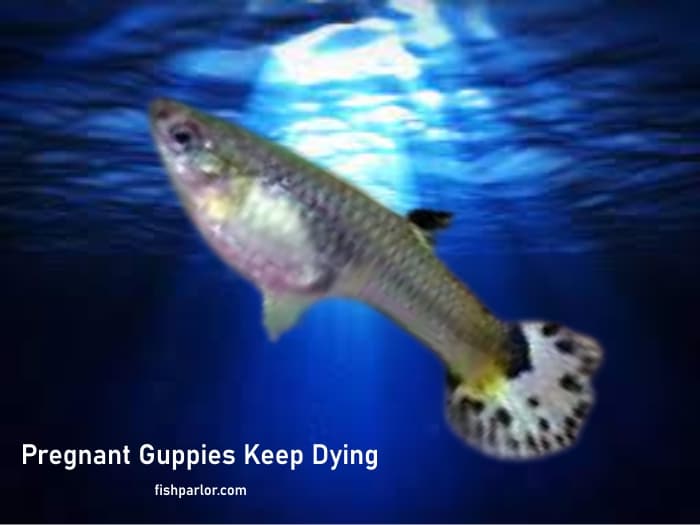
Here are reasons why guppies die when pregnant:
1. High-stress levels
Elevated stress levels cause a lack of appetite, reduced immunity, disease exposure, and malnutrition. In some cases, pregnant gippies may starve to death while hiding from the rest.
Stress is the most common reason for guppies dying before, during, or immediately after giving birth. Stress causes a weak immune that results in complications that leads to death.
Spitting out food immediately after eating also indicates that all is not well. This might not be a common symptom that a pregnant guppy is not fine. However, it is critical to ascertain the reasons for the behavior.
2. Fatigue
A pregnant guppy must fight off males who often want to mate. One female might have to contend with several males daily while pregnant. Too much physical activity while pregnant is likely to cause unnecessary fatigue that may lead to weakening and slow death.
3. Predators
Pregnant female guppies are vulnerable to predators as they cannot engage in regular activities. They are usually under threat of being attacked, killed, and even eaten by other fishes and organisms that may predate on them.
The first signs of aggression are usually directed at males. When pregnant, alarmed females become withdrawn. This is the first sign of feeling threatened. They may also become aggressive towards other types of fish.
4. Dropsy
Dropsy is a common condition in fish with infections. It is a condition where microorganisms that attack the fish produce gases leading to the same build-up in the fish’s body cavities. Guppy dropsy is why some people may think their guppy has been pregnant forever since the gas build-up is often confused for pregnancy.
Injuries may cause such infections that the fish might sustain through different means. Therefore, guppy dropsy should be checked since the condition can also affect pregnant females.
5. Oxygen deficiency
Since pregnant guppies have an increased demand for oxygen, ensure that their habits are well-oxygenated. See that they live in optimal conditions that allow them to thrive. For instance, the water pH should not be below 6.8 and must not exceed 7.8. The temperature must also be maintained between 70-80 degrees Fahrenheit.
Labor complications combined with insufficient oxygen may also lead to the guppies dying when giving birth or immediately after. For instance, labor may sometimes prolong, leading to the guppy tiring out and eventually dying.
It is critical to note that guppies may undergo prolonged labor, and such a situation cannot be saved. The guppy will rely on luck, which will determine whether it lives beyond birth or not.
6. Can guppies miscarry?
While there is no proof that guppies or fish can have miscarriages, stress or infections during pregnancy can cause premature deliveries. In this case, the fries may die since they are not ready for the outside world.
It is common for stress to affect the gestation period, which is usually between 21 and 30 days. Any elongation is likely to strain the fry. The fry will likely die in the womb due to the lack of oxygen as they are fully grown and need to breathe freely in the water.
Guppy miscarriages can happen; in most cases, the female will also die. Stress or underlying health conditions during pregnancy always influence prolonged or shortened pregnancies.
It is critical to ensure that the female guppy stays as healthy as possible and lives in a conducive environment to avoid premature births and miscarriages.
How to keep pregnant guppies from dying
A pregnant guppy can be moved to a different tank with the appropriate water conditions. While moving is not a requirement, but is critical in maximizing its chances of survival. This reduces the stress levels that females are likely to experience. Ensure that the babies have a perfect hiding place to make their mothers more relaxed.
1. Provide hiding spots
Introducing fine-leafed plants may also be necessary to help the fry hide after birth. Remember that the female is usually more concerned about the security of her babies.
Apart from plants, aquatic rocks can also give them great hiding spots. This way, they will have a safe place to rest and feel safe from their mates in a tank.
2. Improve their nutrition
Pregnant guppies require better nutritional care as they usually experience a drop in their appetite. It is necessary to introduce food with as diverse nutrition as possible, even if they do not eat much. They may also need that nutritional value in food after delivery.
Note that the fry takes up much space in a female’s belly. Therefore, the guppy might not manage to eat as much as it would if it were not pregnant. Poor nutrition can also be a reason why a pregnant guppy may not give birth as expected.
3. Warmth
Maintaining the warmest temperatures of about 80 degrees Fahrenheit would be advisable. The reason is that guppies are tropical freshwater fishes that enjoy warm climates. The warmth also creates a more conducive environment than a cold habitat.
In guppies acclimated to 23 (73.4°F) to 30° C (86°F)., exposures to temperatures below 10° C (50°F). produced “primary chill coma” while exposures to lethal temperatures above 10° C. caused “secondary chill coma.”
The University of Chicago Press Journals
It may help to install an aquarium water heater to help regulate and maintain the water temperatures. Also, it would be good to keep the lights low to create the impression that the pregnant guppies are not exposed.
Note that pregnant guppies are highly sensitive to environmental changes. It would be fair to ensure they do not experience shock after relocation to other tanks or environments.

